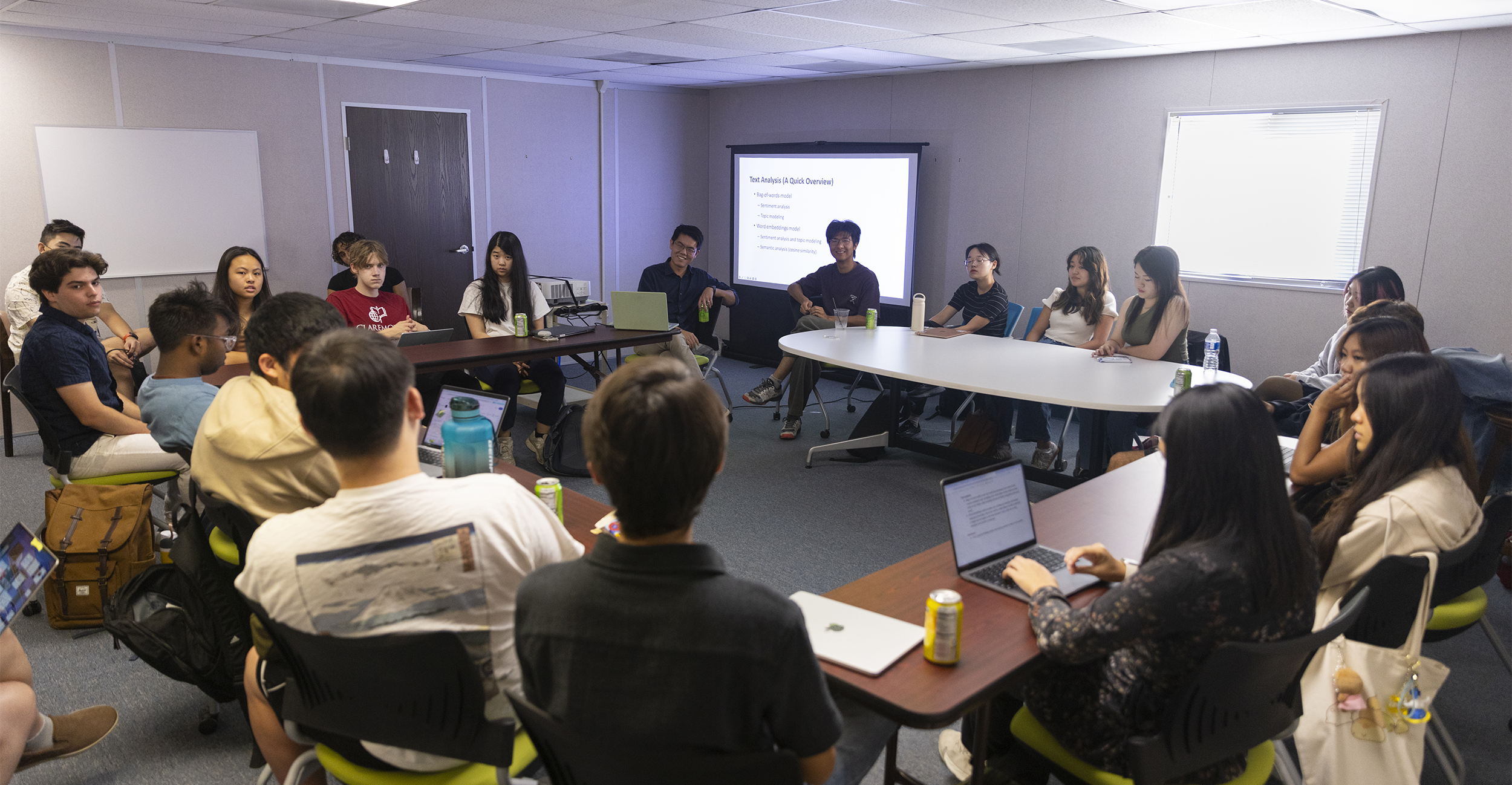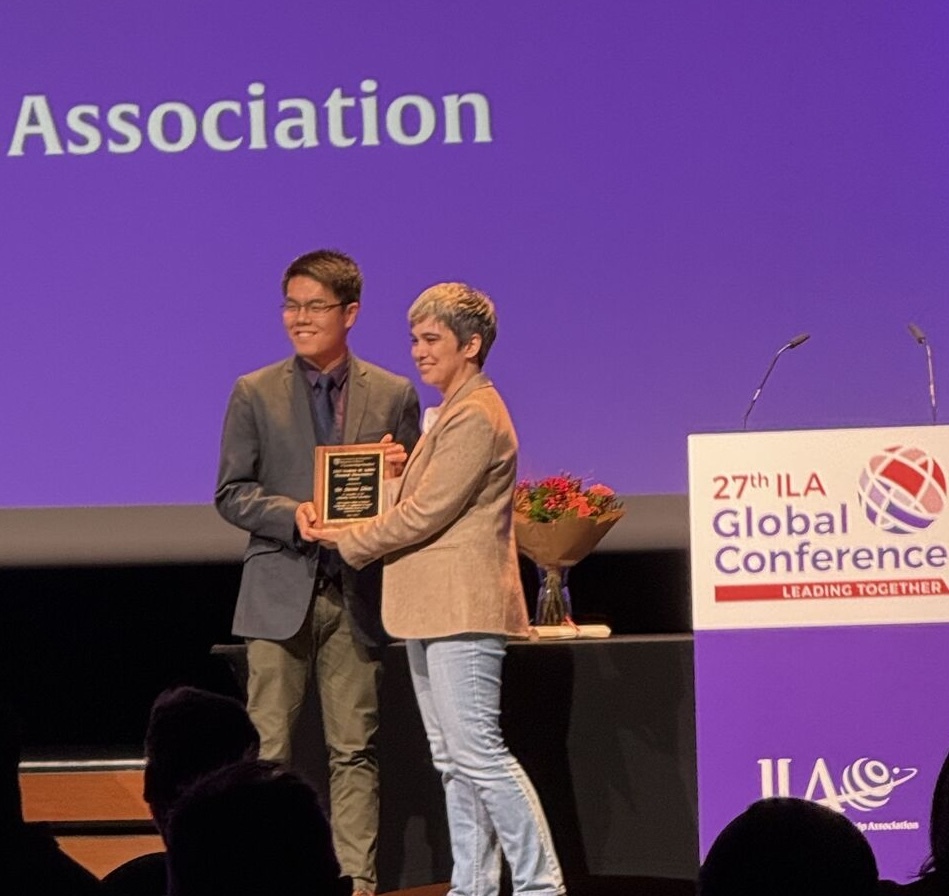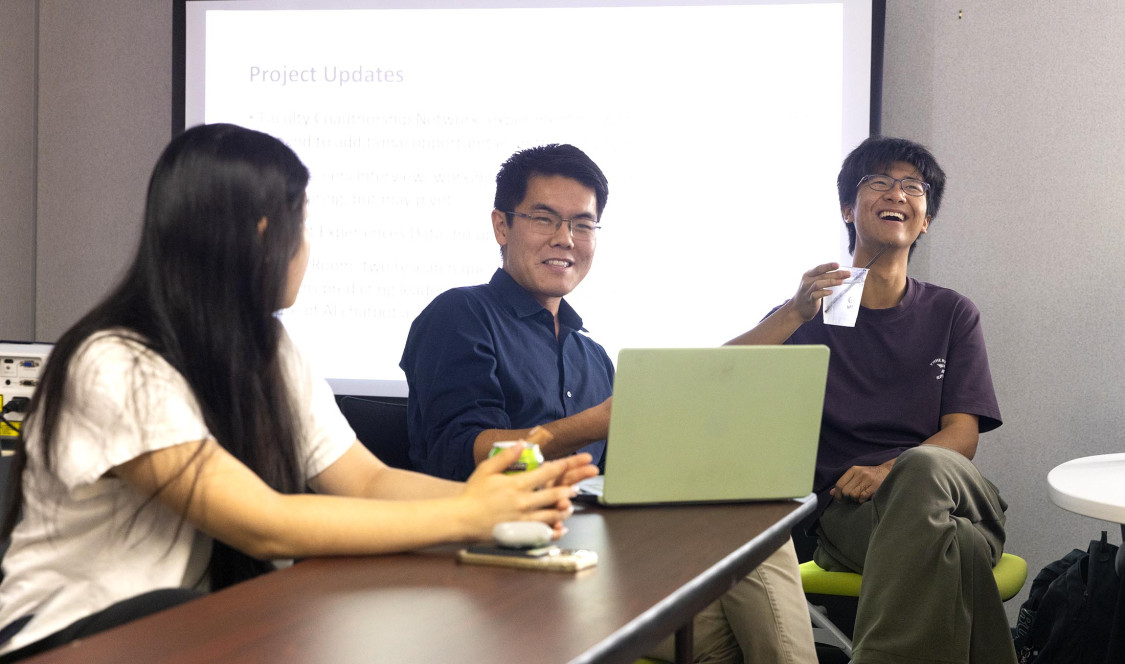“Are you playing a statistics song?” asked a student as she walked into Professor Steven Zhou’s class.
Her ears did not deceive her.
Steven Zhou, Assistant Professor of Psychological Science, was piping the dulcet tones of statistical equations into his “Stats for Psychological Science” classroom. With a “decent music background” of his own and wanting to thoughtfully integrate artificial intelligence into his teaching, Zhou created several AI-generated playlists to help his students master course material.
“Psych Stats” student Jordan Nguyen ’28 found the songs “surprisingly quite good,” and said he may use them as a study tool in the future “as there are a lot of statistical tests to learn.”
Zhou would be happy with modestly successful results: “I don’t expect this to be a gamechanger in helping students study, but if it makes them a little more comfortable with the material and inspires them to want to learn more, that’s a win.”
Acknowledging that AI “is scary, and yes, there are a lot of things that are concerning,” Zhou takes a very intentional approach to its use in academic assignments. He wants to help students develop the right set of skills and appropriate methods of reliance that don’t detract from critical thinking and true learning. “I’m carefully thinking through ‘how do I have students use AI for these assignments, but not for these?’”
Take, for instance, a debate assignment for which AI research is explicitly permitted.
“What I’m really testing is their mastery of the material—can they convincingly describe their findings, and can they do that on the fly in a debate? You can’t do that if you’re solely reliant on AI.”
Zhou joined the CMC faculty this semester, having found precisely what he was seeking: “I wanted to be at a balanced institution. I love doing research, but I also love teaching, and CMC, by far, supports both,” explained Zhou, who completed his undergraduate degree at Pepperdine University and his Ph.D. at George Mason University.
Opportunities to bring new courses to CMC underscores Zhou’s excitement to be at the College. This spring, he will teach “Advanced Statistics: Psychometrics and Multivariate Methods” for the first time, training students in advanced quantitative methods directly applicable to their research, senior theses, and consulting projects.

Student success is paramount for Zhou, whether finding unique ways to present course material or mentoring students in his STATS Lab, where participants—both paid research assistants with support from CMC’s Gould Center for Humanistic Studies and Lowe Institute of Political Economy, as well as students less formally involved—use quantitative methods to measure and understand human behavior.
Azra Karaman ’29 was among the 33 students who turned out for Zhou’s first lab meeting. Now a STATS Lab research assistant completing an Economics major and Data Science sequence, Karaman raved about the experience.
“Dr. Zhou is one of the most sincere, down-to earth, fun professors I’ve met. He is energetic, engaging, and makes it apparent he values his students and their contributions,” said Karaman.
Nguyen, a STATS Lab program assistant, was compelled to get involved because “important decisions in every industry demand a robust data backbone.”
“And in Dr. Zhou’s lab, I am learning every aspect of the data life cycle, from collection to analysis to the archive,” Nguyen said, adding that working with Dr. Zhou is “amazing!”
A recognized expert on leadership, Zhou has laid the groundwork to turn STATS Lab into an “escape room” this spring to collect data on team dynamics and leadership emergence. In an escape room, a group of people are “locked in” to a space outfitted with clues that must be collaboratively solved to get out—a “leaderless group simulation,” Zhou explained.
“When you don’t assign a leader, how do they emerge, and what predicts emergence? It’s a perfect case study for how people behave without an assigned role and learn how to communicate.”
As Zhou is inclined to do, he is considering how AI could enhance the escape room studies, referencing some “up and coming” AI-based models that interpret expressions. “They can look at facial gestures and predict what your emotion is. So, I’m thinking, can that be leveraged here?”
In his untiring zeal for trying out new things, Zhou wants to inspire students to follow their curiosity where it leads, without attachment to a particular outcome.
“In our pursuit of truth, let’s always be willing to be proven wrong. There are many things you’re going to be wrong about, but you have to be willing to take the risk and try it,” Zhou said. “I look at everything with, ‘Oh, that’s interesting, let’s just see where that goes.’”
And sometimes, he acknowledges, an idea or an experiment “goes absolutely nowhere”—a truth that inspired a lighthearted take on the “STATS” Lab acronym: “Some Theories are Totally Spurious.”
“You know, some days it’s just not going to work out.”

And on other days, it’s going to work out quite well: Zhou recently published his first book, co-authored with Graziella Pagliarulo McCarron, From First Job to Career: Research and Narratives (Cambridge University Press, 2025), and earned national and international recognition for his contributions to the leadership field, including the Alvah H. Chapman Jr. Dissertation Award and the Fredric M. Jablin Doctoral Dissertation Award.
In October, Zhou accepted the latter at the 27th International Leadership Association Global Conference in Prague, where he, along with Psychological Science colleagues David Day, Ron Riggio, and Sherylle Tan, delivered talks. Zhou spoke about his dissertation, which examines how distributed leadership models can create unexpected negative outcomes like relationship conflict and role overlap.
“It was a pleasure traveling to Prague to attend the ILA conference alongside several of my fellow faculty at CMC. Professors Day and Riggio both won the Lifetime Achievement Award in previous years, so it was an honor to follow in their footsteps by receiving the Jablin Award this year.”
Watch Zhou’s November 13 CMC Connects discussion, “Leadership Meets Data Science: Insights from Research at CMC with Professor Steven Zhou,” and take a musical adventure with his AI-generated songs based on his “Organizational Psychology” and “Statistics for Psychological Science” lectures.

